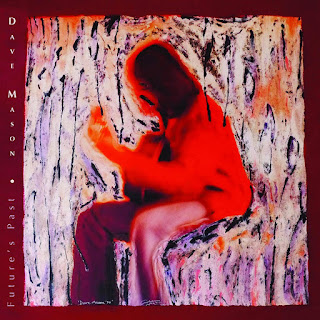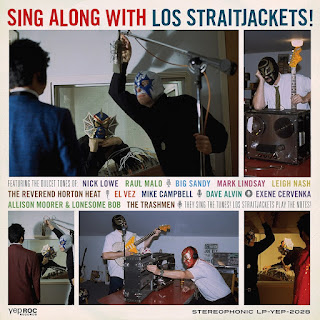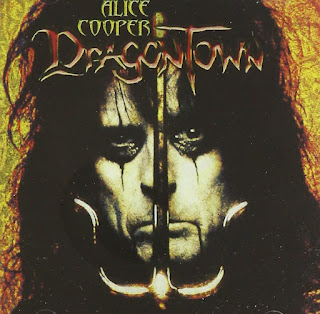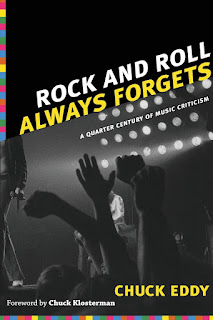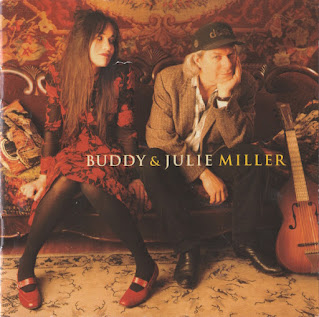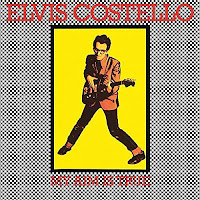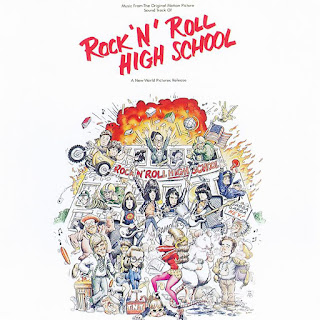Friday, April 28, 2023
Archive Review: Ian Siegal’s Man & Guitar (2014)
Siegal is unaccompanied on Man & Guitar, which documents an October 2013 solo performance by the bluesman at the Royal Albert Hall in London, England, recorded (and, presumably, broadcast) by the BBC as part of the London Bluesfest. Man & Guitar is a lively, loving appreciation of blues music in all its glory, a mostly-original set of ten songs with a few tracks of between-song storytelling. Siegal evinces a natural charisma, and his joy in the performances is quite evident. Whether he’s growling like Howlin’ Wolf on the Delta-dirty “Mortal Coil Shuffle,” channeling Charlie Patton on the legend’s “Pony Blues,” or belting out an original like the powerful “Falling On Down Again,” Siegal imbues each performance with emotion, passion, sweat, and tears. One of the 21st century’s most talented bluesmen, Ian Siegal is entertaining, illuminating, and thought-provoking all at once. Grade: A (Nugene Records, released June 10, 2014)
Buy the CD from Amazon: Ian Siegal’s Man & Guitar
The View On Pop Culture: Wendy Carlos, Blind Pig Records 25th Anniversary (2001)
V1.14
Although not often credited as such, Wendy Carlos was a major innovator in the field of electronic music. Her groundbreaking efforts directly influenced such subsequent genres as ambient music, New Age, techno, and electronica, all of which depend heavily on the synthesizer as a lead instrument. Carlos studied musical composition at Columbia University under Vladimir Ussachevsky and Otto Leuning. While working as a studio engineer in Manhattan, the young classical music enthusiast met up with Dr. Robert Moog, an innovator himself and the inventor of the Moog Synthesizer.
Carlos recognized the synthesizer’s potential and recorded her first album with the instrument in 1968. Switched-On Bach (East Side Digital) proved to be a remarkable showcase for the largely unknown electronic instrument. Her electronic recreations of fugues and concertos, although scorned by classical purists, was a big hit with the mainstream audience, winning three Grammy™ awards and becoming the first classical recording to be certified Platinum™ for one million units sold. A digital recreation of Bach’s “greatest hits,” Switched-On Bach transfers to compact disc with great clarity and resonance.
Carlos followed her debut with a couple of similar classical reconstructions, which would receive lukewarm response. She would hit a homerun again in 1971 with her original score for the Stanley Kubrick film A Clockwork Orange. Also reissued by East Side Digital, the project would show the roots of an evolution in Carlos’ sound, the soundtrack mixing electronic interpretations of Beethoven and Rossini with original compositions that sounded like nothing before (or since). These instrumental interludes were the first shots in a musical revolution that would yield such influential electronic artists as Larry Fast, Kraftwerk and Neu. Carlos would also use this album to introduce the Vocoder voice synthesizer into popular usage.
Carlos would continue her sojourn into what would later be called “New Age” music with the brilliantly realized 1972 release Sonic Seasonings (ESD), a two-album set of “environmental” music. Using natural sounds combined with subtle electronic flourishes to compose suites for each of the four seasons, the album paved the way for dozens of musical imitators. This 2-CD reissue also includes Land of the Midnight Sun, a previously unreleased project from 1986 that extends and builds upon the suites composed for Sonic Seasonings, serving as a sort of artistic bookend for this important and often overlooked work.
Better than a decade later, Carlos would again revolutionize electronic music with 1986’s Beauty In the Beast (ESD). A masterful and disturbing hybrid of digital sound, classical composition and traditional music from around the world (Tibet, Bali, Africa and East Europe), the project redefined electronic music as a medium rather than a style. The most difficult Carlos album to listen to, with unusual tunings and cacophonic rhythms, Beauty In the Beast is nevertheless worth the effort, the album a musical revelation that would subsequently inspire artists such as Brian Eno and David Byrne to mix world music with electronic pop.
Carlos continues to record sporadically. A pioneer in sound reproduction, Carlos has worked with various software developers and is well known as a sound engineer. Unlike many artists who have no input over their early work, Carlos was intimately involved with the production of these reissues; her background in engineering and electronics no doubt valuable in coaxing the best sound possible out of tapes created by what is now ancient technology. Other Wendy Carlos titles in the East Side Digital reissue series include 1969’s classical collection The Well-Tempered Synthesizer, 1984’s Digital Moonscapes, and Tales of Heaven & Hell from 1998. All of the reissues feature crystal-clear 20-bit remastering and are enhanced with content available via computer. More information on Wendy Carlos can be found online at www.wendycarlos.com.
I remember living in Detroit back in 1979, haunting local clubs like the New Miami to hear performances by rockers like Sonic’s Rendezvous Band, Destroy All Monsters, and the Romantics. If you wanted to hear the blues, though there was just one place to go – the basement of the Blind Pig Café on South First in Ann Arbor. The club drew all the major league heavyweights of the blues world; they put out records too, on their own Blind Pig Records imprint. The first Blind Pig album I remember buying was by roots rocker Steve Nardella and I’ve spent a lot of cash on records from the Blind Pig folks since then.
A quick glimpse at the line-up of talent for the double-disc Blind Pig Records 25th Anniversary Collection shows exactly how the label managed to extract so much of my coin during the past quarter-century. The 35-song retrospective of the label’s history includes material from such blues legends as Arthur Adams and B.B.King, Muddy Waters, Snooky Pryor, Johnny Shines, Pinetop Perkins and James Cotton as well as contemporary mainstays like Tommy Castro, Jimmy Thackery, and Mitch Woods.
The collection also includes the contributions of fresh, young blues talents like Popa Chubby, Deborah Coleman, Joanna Connor, and Big Bill Morganfield. A third disc included with the set is a CD-ROM that includes interviews and performance videos that can be watched on your computer screen. Did I mention that the set sells for the price of a single CD? Blind Pig Records has been able to stay atop of the blues game for twenty-five years and this anniversary collection is a fitting tribute to the label’s vision and integrity. (View From The Hill, October 2001)
Friday, April 21, 2023
Archive Review: Dave Mason’s Future’s Past (2014)
Mason’s “World In Changes,” from his 1970 debut album, is provided a languid reggae rhythm to go with his stuttered vocals, while “As Sad and Deep As You” offers some beautiful, exotic Spanish guitar and a classic rock vibe wide enough to drive a semi through. Johnson’s “Come On In My Kitchen” is modernized somewhat, but the Delta-bred hoodoo still shines through, and Mason’s vocals and fretwork alike are joyfully spot-on, supported by Bob Corritore’s wailing harmonica. The album’s only new track, “That’s Freedom,” is a brilliant rocker, an old hippie’s lament if you will with clever pop culture references and a dark underlying message. Mason’s voice hasn’t changed much since the 1960s, and it’s still the warm instrument it’s always been throughout the songs on Future’s Past. It’s Mason’s guitar that speaks the loudest here – bluesy, complex, invigorating, and imaginative. His fretwork has always been Mason’s most overlooked attribute, coming up as he did in an era that can boast of Eric Clapton, Jimmy Page, et al. As shown by Future’s Past, Mason can still ride with the best of ‘em. Grade: B+ (Something Music, released May 13, 2014)
Buy the CD from Amazon: Dave Mason’s Future’s Past
The View On Pop Culture: Los Straitjackets, Witness U.K., Alice Cooper, Moses Avalon's Secrets Of Negotiating A Record Contract (2001)
V1.13
It’s an established fact among experts in these sorts of things that Los Straitjackets have long been the coolest psychotronic surf guitar band in the known universe. Clad in Mexican wrestling masks, these mutant offspring of an unholy marriage of Dick Dale and Joey Ramone have kicked out four incredible albums of surf-garage-rockabilly instrumentals since 1995. With album number five the fantastic foursome hit upon a novel idea – why not add vocals to the songs?
They do just that on Sing Along with Los Straitjackets (Yep Roc Records), enlisting the help of accomplished vocal technicians like Raul Malo of the Mavericks, Leigh Nash of Sixpence None The Richer, Dave Alvin, Allison Moorer, Exene Cervenka of X, and many others. The result is a glorious collection of cover tunes, Los Straitjackets providing the power and various singers contributing the finesse to classic rock, pop, and country material like Roy Orbison’s “Down the Line,” Jessi Colter’s “I Ain’t the One” and Scooter Davis’ “The End of the World.” Guitarists Danny Amis and Eddie Angel blaze like a house afire while beatmeisters Peter Curry and Jimmy Lester hold down the bottom line behind folks like the Rev. Horton Heat, Big Sandy and Nick Lowe. The hippest CD you could buy this year, Sing Along with Los Straitjackets cements the reputation of these maniac musicians as the baddest surf-rocking daddios ever!
The recipients of the biggest British music press hype since Oasis recorded their first demo tape, Witness U.K. have lived up to every compliment thrown their way. With their second album, “Under A Sun” (MCA Records) they seem to be poised to break through to a stateside audience unaware of the furor the band has created in their homeland. Treading the same introspective folk-rock vein as R.E.M., who Witness U.K. is often compared to, the band also incorporates influences as diverse as Tim Buckley, Van Morrison, and Neil Young into a distinctive sound. Beautifully crafted songs like “Here’s One For You” and “Dividing Line” feature singer Gerard Starkie’s powerful and engaging vocals. Delicious harmonies, multi-layered guitars and a dense rhythmic undercurrent match the band’s thoughtful lyrics. Radio-friendly, intelligent, and charismatic, “Under A Sun” shows that Witness U.K. is much more than the typical British pop band.
Rock legend Alice Cooper never really went away, you know – he’s been busy recording albums, performing live and inspiring dozens of lesser artists. Like many aging rockers, the major labels want nothing to do with Cooper, who still commands a sizeable following even if he can’t move the multi-Platinum™ numbers that a copycat like Marilyn Manson can. The five families’ ignorance is our loss, however, ‘cause with the indie effort Dragontown (Spitfire Records), Cooper delivers his best solo effort since Welcome To My Nightmare. Dragontown kicks off with the unrelenting “Triggerman,” an ultra-cool tune that, in a better world, would dominate FM radio. From there Cooper jumps into a collection of songs that portray a rock ‘n’ roll purgatory where Jim Morrison, John Lennon and Elvis Presley rub elbows with disgraced nuns and psychotic soldiers in tunes like “Sex, Death And Money” and “Disgraceland.” Cooper’s theatrical style and macabre vocals are perfectly suited for the nightmarish imagery of his lyrics while unrelenting instrumentation both cuts wide swaths of destruction and jabs precisely like some manic musical sword duel. After thirty-plus years, Alice Cooper still creates music that is both hypnotic and horrifying, Dragontown proof for young metalheads that the old dog still has a few tricks up his sleeve.
Every youngster who has ever picked up a guitar or a drumstick has dreamed of achieving fame and fortune playing music – “following that rock ‘n’ roll star” as songwriter Threk Michaels has called it. Out of the thousands of bands that begin this sojourn, some will manage to make a name for themselves on the regional bar circuit while a mere handful ever get the chance sign a recording contract. Without exception, though, every single one of these superstar wannabes is at a disadvantage when dealing with even the smallest of labels. Secrets Of Negotiating A Record Contract (Backbeat Books), the second book by pseudonymous author Moses Avalon, shows that the label always holds all the cards.
An award-winning engineer and producer, Moses Avalon has a unique perspective forged by almost two decades experience in the music biz. If his excellent first book, Confessions of A Record Producer (Backbeat Books) blew the lid off the industry’s dirty little secrets, his latest effort deciphers the various pitfalls, loopholes and booby traps found hidden among the dense legalese used in the typical recording contract. Avalon offers segments of real contracts, explains what the provisions mean in real life and offers an analysis that is educated, informative and tempered by a great deal of experience and humor. Working with several music industry lawyers, Avalon has created the first blueprint available for musicians to negotiate their contract with knowledge and insight. Heed the Reverend’s warning – if you are a musician, no matter the genre – you should carry a copy of Secrets of Negotiating A Record Contract with you until you know it like you do your instrument. Get it now! You’ll thank me later... (View From The Hill, October 2001)
Friday, April 14, 2023
Book Review: Chuck Eddy's Rock and Roll Always Forgets (2011)
As writing about music evolved beyond the milieu of handmade zines and poorly-distributed magazines, it would eventually become known as “music journalism,” and album reviews and artist interviews could be read everywhere from syndicated columns and glossy mainstream publications to small-town newspapers. Until recently, many big city newspapers usually had one, if not two writers working the “entertainment beat,” talking about music and such. Not coincidently, the downfall of music criticism can be traced somewhat to the advent of the Worldwide Web, which allowed anybody to be a publisher, and everybody to be a critic, albeit without editors and whether or not they had writing chops, or even a faint knowledge of music history whatsoever.
Now the Reverend has a vested interest in this unfortunate evolution of music criticism, what with being an old-school rockcrit who teethed on Marsh and Bangs and Metzger, and who mentored under, perhaps, the greatest of the early rock ‘n’ roll wordsmiths – the one and only Rick Johnson. But the Rev is no aging Luddite blaming all the publishing industry’s ills on the gosh danged Internet. While the web has definitely upset the traditional applecart as far as music magazines go, it has also enabled low-budget, high-quality media outlets like Blurt to exist.
But even among the glut of online music zines and personal blogs, a few intelligent voices have managed to rise to the top like cream, writers like Jim DeRogatis, Martin Popoff, Fred Mills, and Chuck Eddy managing to bring new insight and perspective to an increasingly noisy critical realm too often overwhelmed by static and poorly-formed opinions expressed in too-brief reviews. Eddy, in particular, has distinguished himself as a critic to be reckoned with, both as music editor at the Village Voice and as a contributor to such publications as Creem, Rolling Stone, and Spin, among others. Eddy has also penned a couple of highly-entertaining tomes of music criticism and theory – The Accidental Evolution of Rock ‘n’ Roll, and the controversial and often hilarious Stairway to Hell: The 500 Best Heavy Metal Albums in the Universe, which made a strong argument for the inclusion of recordings by funk-soul diva Teena Marie.
Eddy’s latest book, Rock and Roll Always Forgets, is sub-titled “a quarter century of music criticism” and, as such, it collects essays and reviews chosen from throughout Eddy’s 25 years as one of America’s most entertaining and annoying music critics. While it suffers slightly from a lack of an overall concept as his previous books, Eddy has broken everything down to thematic chapters, such as “Predicting The Future,” in which he illustrates the futility of predicting where music is going by using his own past statements, and “Alternative To What,” where Eddy questions the often-mindless pigeonholing of music through reviews/essays on the Ramones, Big Black, SST Records, Nirvana, Marilyn Manson, and others.
Much of Rock and Roll Always Forgets is entertaining and thought-provoking as only Eddy can achieve. Chapters tackle heavy metal (Metallica, AC/DC, Def Leppard); hip-hop (Sir Mix-A-Lot, Just-Ice, Spoonie Gee); and pop music (Debbie Gibson, Pet Shop Boys) as well as offering perspective on the racial aspects of soul and rap music with fascinating pieces on Eminem, Kid Rock, and the aforementioned Teena Marie. Most of this stuff is well-written and insightful, offering a unique perspective and personality that few music critics are wont to reveal these days. Eddy’s willingness to champion genres often ignored or outright disdained by the typical rock critic, such as metal and rap, is legendary, but he also displays a deft hand at writing about pop and even vintage music.
Still, it’s easy to find evidence of middle-age dementia creeping into Eddy’s work. His complimentary reviews of contemporary Nashville floss like Mindy McCready, Toby Keith, and the horrible Big & Rich, among others, may read well, but they also provide cause to suspect Eddy’s critical credentials. Sure, Eddy has covered glossy pop like Michael Jackson and the Spice Girls before – and done so without a hint of irony or patronizing opinions – but his dismissal of “pseudo-traditionalist hypocrisy” as the “country party line toed by most rock critics” as an excuse to wax ecstatically about Montgomery Gentry is pure D bullshit.
Like whatever music that you wanna like, Chuck, but the Reverend is old enough to remember when Jon Rich was trying (in vein) to become a rock star in Nashville and Toby Keith was the punchline to a Music Row joke. Country music really was better back in the day of Johnny Cash and Waylon Jennings and David Allen Coe, and its current persona as 1970s-era singer/songwriter lite-rock with twang is a slap in the face to those that came before. That’s not a party line to be drawn in the sand, that’s just reality. Coe might be one ugly sumbitch, but he can sing circles around today’s crop of country stars relying on Pro Tools and image consultants to get over with the suburban housewives that buy their records. Don’t try and sell us sour milk and claim that it’s aged whiskey…
Eddy’s critical flights of fancy notwithstanding, he’s a solid writer of no little wit and humor, and if we readers (such as yours truly) can agree to disagree on some of the dreck that he immortalizes in Rock and Roll Always Forgets, we can all find middle ground. As music critics go, Chuck Eddy has always been a bit of a provocateur, and his tendency to risk ridicule with absurdist or unpopular critical stances is what has always made him an engaging and intelligent writer. Rock and Roll Always Forgets certainly includes its share of those questionable moments, but it’s also an entertaining and informative look back at the past quarter-century of popular music. (Duke University Press, published August 10th, 2011)
Review originally published by Blurt magazine, 2011
The View On Pop Culture: Beatiful Creatures, Buddy & Julie Miller, BadAzz Mofo zine, The Terminator DVD (2001)
 |
| Beautiful Creatures |
V1.12
A full-blown ‘80s rock revival is right around the corner, loyal readers. As such, it’s no longer “passe” to enjoy hard-rocking, hard-partying MTV bad boys like Motley Crue or Poison. L.A.-styled “glam metal” is back in vogue, the first shot of nostalgia fired in the form of Beautiful Creatures. The band’s self-titled debut Beautiful Creatures (Warner Bros. Records) opens with a guitar riff straight out of the Mickey Most playbook, dropping the listener through a cultural rabbit hole and onto the Hollywood music scene circa 1985.
Appropriately enough, an authentic L.A. glam band shouter – former Bang Tango frontman Joe LeSte – fronts Beautiful Creatures. Add a couple of fine young guitarists in the form of DJ Ashba and Anthony Focx, both weaned on Metallica and Black Sabbath, match them with an explosive rhythm section and you have a first rate wrecking crew. Beautiful Creatures reminds me a lot of the underrated and influential early ‘80s band Hanoi Rocks. Like those Finnish glamboys, BC rocks as hard as a hailstorm, filling their debut with everything an appreciative headbanger could ever want. From radio-friendly rock (“Ride”) to the obligatory power ballad (“Wish”) to guitar pyrotechnics (“Step Back”), Beautiful Creatures manages to raise the roof with reckless abandon. With LeSte’s soaring vocals and twin guitars that slash like a sabretooth’s eyeteeth, Beautiful Creatures bring the sheer joy and spirit of rocking loudly to tunes like “New Orleans” and “Blacklist.” It’s an impressive debut from a band that is probably a year or two ahead of their time.
For their first album together, the two have drawn heavily on Julie’s considerable songwriting skills, exploring such musical paths as traditional country (“Little Darlin”), edgy blues (“Dirty Water”) and Steve Earle-styled roots rock (“The River’s Gonna Run”). The handful of cover songs they’ve chosen are priceless, from Richard Thompson’s bittersweet “Keep Your Distance” to Dylan’s winsome “Wallflower.” Julie’s sweet, high-pitched vocals are matched by Buddy’s twangy growl, the differences between the two singers oddly effective. Buddy is an excellent guitarist, bringing a great deal of emotion and passion to his playing while Julie’s charisma shines through every song. A favorite of the alt-country crowd, Buddy & Julie Miller are a unique pairing, their first album together a wonderful display of talent and hard-won experience.
Hollywood may crank out its big-budget blockbusters, but a lot of movie fans still prefer low-budget morsels like The Warriors or The Evil Dead. David Walker’s excellent BadAzz MoFo zine covers the “Blaxploitation” film beat, Walker and his small staff doing an invaluable job documenting the mid-seventies phenomenon of films like Shaft and The Mack that reflected and helped define African-American culture at the time. Issue #6 of BadAzz MoFo offers interviews with actors Glynn Turman (Cooley High) and Antonio Fargas (“Huggy Bear”) and singer/actor Corey Glover (Living Colour). The zine also includes an insightful article on the fondly remembered Fat Albert & The Cosby Kids cartoon, an informative guide to the DVD format and more movie reviews that you can digest in one sitting. An entertaining and well-researched publication, BadAzz MoFo delivers a much-needed perspective on an often-overlooked facet of pop culture. Check them out on the web at www.badazzmofo.com.
Long before Titanic became the highest-grossing movie of all time, director James Cameron was just another graduate of Roger Corman’s New World Pictures who was chasing hard coin in Hollywood. At the time of its 1984 release, The Terminator (MGM Home Entertainment DVD) was a low-budget sci-fi long shot that ended up paying off big-time for both Cameron and star Arnold Schwarzenegger. A chilling tale of a post-apocalyptic future in which machines rule the planet, Arnie plays a killer robot sent back in time from 2029 to 1984 to kill Sarah Connor (played to perfection by Linda Hamilton), the would-be mother of the future savior of mankind, John Connor.
The film’s special effects and action sequences are still breathtaking, the DVD’s improved digital picture and sound jumping right out of your screen and speakers. Special features like a director’s commentary and a pair of documentaries make this a nice set for fans, and if this “special edition” DVD of The Terminator isn’t quite as nice as last years T2 set, it’s a welcome addition to the fan’s film library nonetheless. Watch closely for fleeting pre-fame appearances from Bill Paxton and David Hyde Pierce! (View From The Hill, September 2001)
Friday, April 7, 2023
Buzz Kuts: All, Fastball, The Specials & The Suicide Machines (1998)
ALL
Mass Nerder
One of the most enduring of punk icons, the All/Descendants conundrum is a lot like tag-team wrestling. For those of you having problems figuring out the players without a scorecard, look at it this way: All is the Descendants with Chad Price singing, while the Descendants are All with Milo Aukerman singing. Still confused? Okay, take the basic team of guitarist Stephen Egerton, bassist Karl Alvarez, and drummer Bill Stevenson. These guys hold the “World Heavyweight Punk Rock Tag Team Championship.” For hardcore death matches they tag in vocalist Milo and appear in the ring as the Descendants. For those nasty Colorado chainsaw cage matches they bring along singer Chad and kick ass as All. Still can’t figure it out? No matter…just run out and buy a copy of All’s Mass Nerder, a real shit-kickin’ collection of punk tunes guaranteed to blister the covering on your speakers and singe the hair on your ears. Delivering non-stop, no-frills punk rock with slightly more of an edge than the Descendants (probably due to the presence of Chad Price, a more guttural and less pop-inflected vocalist than Milo), All are punk legends and deservedly so. Mass Nerder is a dynamite album, perfect for parties or just bouncing off the walls. The Reverend sez “check it out!” (Epitaph Records)
FASTBALL
All The Pain Money Can Buy
Slide All The Pain Money Can Buy into your box and you’ll find a whole lotta pop come flyin’ back at you. A thoroughly engaging debut from this Georgia-based trio, Fastball fills All The Pain Money Can Buy with Beatlesque harmonies, a little Elvis Costello-like wordplay, the restless soul of Alex Chilton, and the ghosts of a dozen long-forgotten pop maestros from Buddy Holly to Don Dixon. The first single, “The Way” is an interesting and enjoyable slice of pop exotica, slightly-hollow vocals matched with Spanish inflected guitar. The rest of All The Pain Money Can Buy matches up to the opening track, every song full of wistful vocals, clever lyrics, charming melodies and infectious energy. “Better Than It Was”, “G.O.D. (Good Old Days)”, and “Sweetwater, Texas” stand out as radio-ready hits, but there’s really nothing terrible or disarming to be found here…just intelligent, good-natured pop/rock with figurative mile-wide grin and enough joyful abandon to fuel half-a-dozen bands. In Fastball the notoriously feeble A & R Department of Hollywood Records has found a keeper. (Hollywood Records)
THE SPECIALS
Guilty ‘Til Proved Innocent!
As any first-year college student can tell you, history tends to repeat itself, chasing its scaly tail in an eternal cycle. If there’s any justice in the cosmos at all, then the Specials will get to reap some of the multi-Platinum™ booty they so richly deserve. Sure, the band had a few moderate hits in the early ‘80s, but it seems that their time is coming around again, and if a washed-out, second-rate echo of a band like No Doubt can grab the brass ring, why not the Specials? One of the more important of the British two-tone bands, the Specials were, and are the literal and figurative godfathers of modern ska. As shown by Guilty ‘Til Proved Innocent!, the band’s latest musical triumph, there’s a lot of life left in these guys yet. With more honesty and sincerity than any so-called “underground band,” the Specials knock out an invigorating set of songs, incorporating pop, rock, punk, and even country (check out “Tears In My Beer”!) elements into their trademark ska rave-up. Hell, these guys are having so much fun with Guilty ‘Til Proved Innocent! that they end up running a couple of songs past the fifteen listed on the cover. After almost twenty years, the Specials sound as fresh and vital today as they did when I first heard them. I can think of no greater testament than that… (Way Cool / MCA Records)
THE SUICIDE MACHINES
Battle Hymns
Detroit’s Suicide Machines (formerly Jack Kevorkian & the Suicide Machines) may not be one of the better-known ska-punk outfits slam-dancing and stage-diving across America, but they may well be the most earnest. These guys blow-out the competition with nasty, wicked, razor-sharp guitar riffs, A-bomb rhythms, and more than a little full-stop ranking. Battle Hymns, their second major/minor label effort overflows with the sort of manic frenzy that the Machines show on-stage. From the ringing opening chords of “Someone” to the final orgasmic notes of “Jah”, the Suicide Machines deliver on their promise, kicking out twenty-two fast n’ furious ska-punk tunes chock-full of metallic fervor and relentless energy. Battle Hymns is hairy-knuckle hardcore rock for guys and gals with the balls to enjoy it. (Hollywood Records)
The View On Pop Culture: The Waterboys, Scott Miller & the Commonwealth, Elvis Costello, Rock 'N' Roll High School DVD (2001)
Not many recording artists can lay claim to creating a legitimate classic album, but Mike Scott and the Waterboys have done it twice. Fisherman’s Blues (1988) and This Is the Sea (1985) melded Celtic folk with British rock to create an entirely new sound that many since have tried to imitate, but nobody has equaled. The first proper Waterboys album since 1990, A Rock In the Weary Land (Razor & Tie) reunites creative frontman Mike Scott with original band members Anthony Thistlethwaite and Kevin Wilkinson for a marvelous collection of songs.
Although there is nothing here to match the band’s classic 1980s output, A Rock In The Weary Land is an invigorating and complex album nonetheless. Infusing their unique sound with traditional instrumentation and elements of blues and folk, the songs here are propelled by Scott’s wonderfully expressive and unforgettable voice. A finely crafted tapestry of spiritual and introspective imagery and skilled instrumentation, A Rock In the Weary Land is an impressive return to form for Mike Scott and the Waterboys.
Over the course of six years and three critically acclaimed and sadly ignored albums, Scott Miller led his band the V-Roys through their paces with energy and intelligence. When that band broke up, Miller took a little time to gather his thoughts and write some new songs. The result of this period of introspection is Thus Always To Tyrants (Sugar Hill Records), the first release by Scott Miller & the Commonwealth. Showcasing a whip-smart songwriting style that has aged gracefully, Thus Always To Tyrants throws together traditional Appalachian-inspired country and folk with 1960s-tinged pop and roots rock in the style of the V-Roys. Miller’s literary lyrics range from the Civil War tale “Highland Country Boy” to the gospel-tinged “Is There Room On the Cross For Me.” As shown by songs like “Across the Line” or “I Made A Mess of This Town,” a magnificent artistic tension is created between the conflict of a rural southern upbringing and the lure of the big city. With love and betrayal, hard times and harder promises around every corner, Thus Always To Tyrants is a fully realized artistic statement and a welcome musical reappearance of the talented Scott Miller.
When Elvis Costello’s My Aim Was True album was released in 1977, the rock world generally didn’t know what to make of the angry young man behind the Buddy Holly glasses and pop sensibilities. Almost twenty-five years later, the disc is considered by most to be a true work of art, a blending of two decades of pop and rock history forged with punk attitude. The recent reissue of My Aim Is True (Rhino Records) places the album in perspective, the two-CD set pairing the sonically-remastered original album with a bonus disc of outtakes and demos for the price of a single CD. My Aim Is True is filled with street-tough rock ‘n’ roll tunes like “Less Than Zero,” “Miracle Man” and “Waiting For the End of the World” as well as the classic ballad “Alison.” Blistering in its passion and intensity, My Aim Is True sounds as powerful today as it did during the summer of ’77. The bonus disc includes material that originally appeared on the out-of-print Rykodisc reissue, including outtakes of “Radio Sweetheart” and “Stranger In The House” along with four previously unreleased songs.
My Aim Is True also includes a twenty-eight page CD booklet with rare photos, song lyrics and commentary from the artist. Rhino has also revisited Spike (1987), which features several songwriting collaborations with Paul McCartney, including the hit “Veronica,” and All This Useless Beauty (1996), a collection of Costello songs originally recorded by other artists. The next batch of Costello albums to be reissued includes This Year’s Model, Blood & Chocolate , and Brutal Youth, part of an eighteen title series featuring bonus tracks and ultra-cool CD booklets.
From Elvis Presley’s Jailhouse Rock to Prince’s Purple Rain to the recent Rock Star, there have been a lot of movies made with a rock ‘n’ roll theme. None can hold a candle, however, to the one and only Rock ‘N’ Roll High School (New Concorde), the trash-rock classic recently released on DVD. The movie stars the Ramones, the greatest punk rockers to ever learn three chords, in a tale of youth gone wild. It’s up to Ramones fan Riff Randle (teen queen P.J. Soles) to free the students of Vince Lombardi High School from the anti-rock tyranny imposed by evil principal Miss Togar (former Warhol ingenue Mary Waronov).
The result is hilarious, with plenty of sight gags, high school hijinx and a soundtrack that includes Alice Cooper, Chuck Barry, Brownsville Station and, of course, the Ramones. Produced by Roger Corman (who else?) and directed by Allan Arkush, Rock ‘N’ Roll High School is the best movie ever made about rock music. The new DVD release includes an interview with B-movie legend Corman, commentary by Arkush and audio outtakes from the Ramones concert at The Roxy in LA where the concert footage was filmed. (View From The Hill, September 2001)





